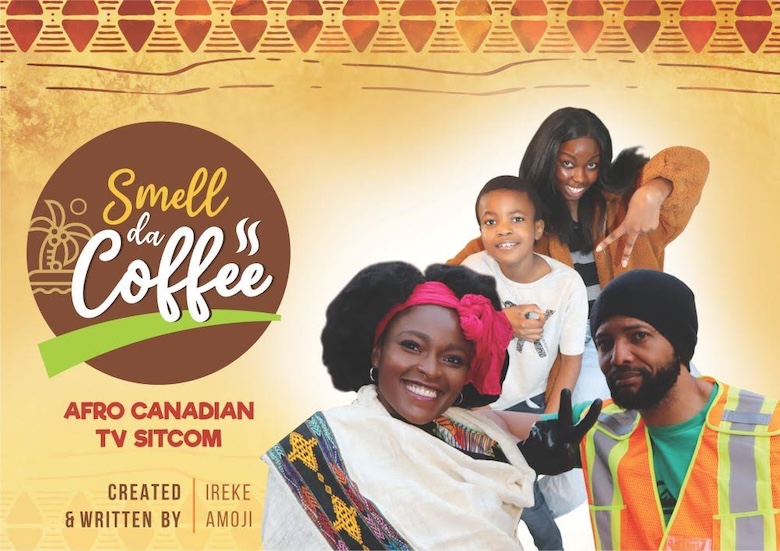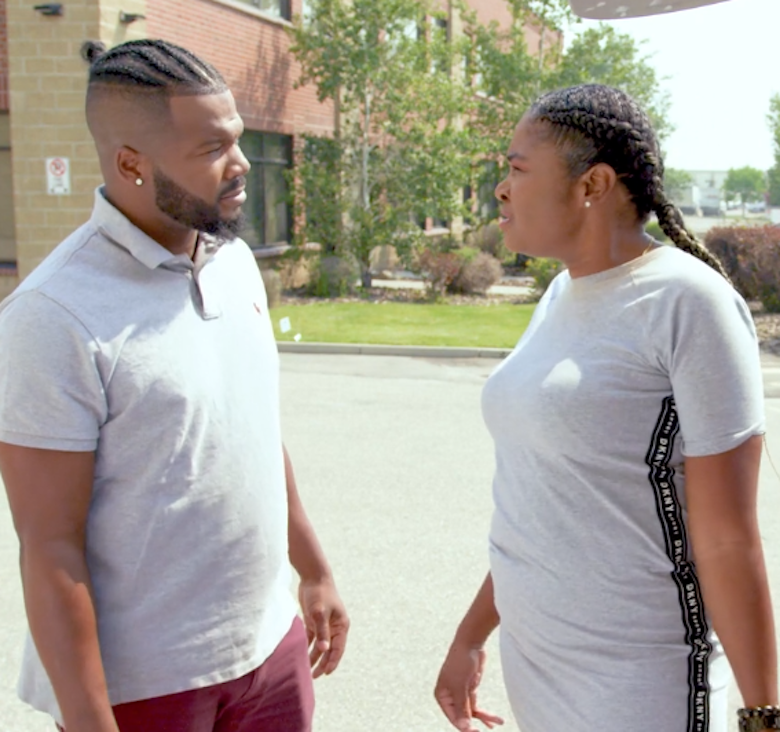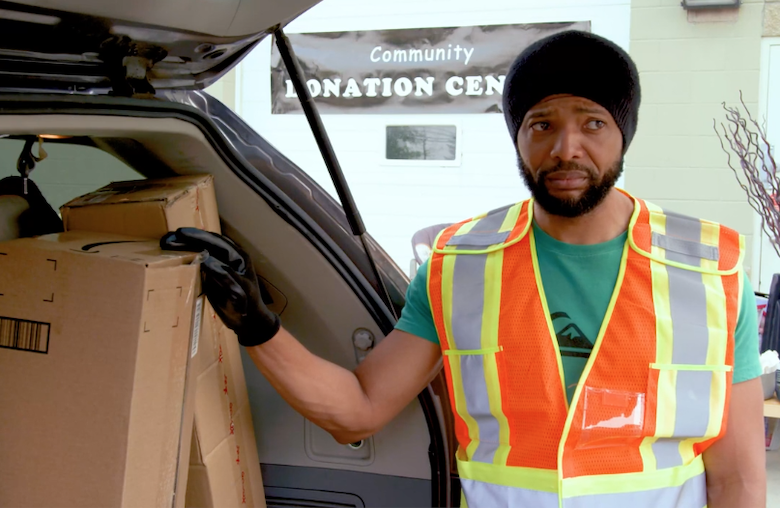“Lai, lai!” (Nigerian slang for “Never!”). “Why should I buy a full goat?” She thunders into her cellphone, “I run a home not a restaurant!”. -She then chuckles and agrees with her unseen friend on the other end to split the purchase of a goat, which would last both families for a couple of months.
This scene welcomes you to the Afro-Canadian (food) stock exchange, an informal market where Afro-Canadians feed their hunger for their sizzling (African) “home cooking”. Scenes such as these have yet to be seen on a mainstream Black Canadian TV comedy show, yet they speak to the very essence of the Afro-Canadian existence, especially among newly arrived immigrants.
In 2020, the Calgary Arts Development Authority (CADA) provided me with a grant to create the pilot for the first Afro-Canadian TV situation comedy (sitcom), to be shot in Calgary. I knew of only two Black led Canadian sitcoms: Lord have Mercy (Vision TV, 2003) and Da Kink in My Hair (Global TV, 2017). There wasn’t a single Black Canadian or Afro Canadian (there is a difference) sitcom on air at that time. To the best of my knowledge, the closest that we Afro-Canadians (Black immigrants or first-generation Black Canadians born in Africa or the Caribbeans) as well as our Black Canadian cousins (born in North America) had for TV sitcom entertainment was the American sitcom Black-ish. (ABC TV, 2014-2022), which was different from our lived experiences in Canada.
I found this rather weird. Wasn’t Canada supposed to be more racially inclusive than the United States? Why then did the Americans have more Black TV sitcoms on air and a long history of that whereas there was not a single Canadian one airing in 2020? The Canadian Broadcasting Corporation (CBC), for instance, has a mandate to reflect Canada’s multi racial quilt. Why were Black led Canadian sitcoms missing? I asked around in Calgary, walking up to diverse Black strangers to see if they would like to have a Black TV sitcom show on air. They did. I randomly asked white strollers on the streets who also said they would be interested in watching.
I knew I could do far more for my people (I’m originally from Nigeria, West Africa) if I could weave the Afro-Canadian stories I heard around me into a TV sitcom.
The sitcom was inspired by the community donation center where I had worked previously as an “Ambassador”, assisting customers to process their donations. I had met a lot of Afro-Canadians who frequently donated at the Center then shopped at the store. I got to hear their very cheerful and sometimes outrageously funny stories. I also heard from snatches of muted conversations, from their silent anxieties, and mono-syllabic responses that they were too tired for polite small talk. The more I got to know them, the more I longed for their return, to know if they had fared better since their last visit.
But I knew I could do far more for my people (I’m originally from Nigeria, West Africa) if I could weave the Afro-Canadian stories I heard around me into a TV sitcom. I would use the healing power of humor to help us cope with the demands of our new community, to celebrate our victories, share and lighten our despairs, to laugh at our foolishness without collectively insulting us, to help us face and hopefully resolve our challenges, to give us hope and show how we could be the best; and more importantly, and to help the world to get to know us better.
Smell da Coffee TV depicts Afro-cultural diversity by using a home/workplace sitcom setting. The pilot is about Obi who has arrived from Nigeria to join his wife Adjoa (originally from Ghana) and two kids Madiba and Uzo-Amani in Canada. Adjoa’s best friend, Ayana, (originally from Ethiopia) is very proud of her ancient Ethiopian culture, which gave the world the gift of coffee. After a frustrating job search, Obi lands a minimum-wage job at a community donation center and makes friends with Ganongo (originally from the Democratic Republic of Congo) who helps him navigate his job and his new life in Canada. One of the pilot’s sub plots is about a hilarious quarrel between a Jamaican couple at the donation center that ends with a romantic marriage proposal.
The sitcom’s pilot isn’t only about fun and laughter. It explores a number of conflicts including the difficult world of gender-identity disputes in Afro-Canadian families. Obi and Adjoa are shocked to learn of their teenage daughter Uzo-Amani’s gender-fluid sexual orientation. Distressed, Obi plans to relocate his family to Nigeria. Adjoa desperately reaches out to Ayana, who decides to resolve the conflict through a thousand-year-old Ethiopian coffee drinking ceremony, the “Jebena Buna”.
At the ceremony, Obi reveals how on their way home from work, Ganongo took him to the cemetery to visit the grave of Canada’s greatest cowboy, a Black man named John Ware. Ganongo speaks of how Ware overcame racism to become a legend which has inspired him deeply. Obi announces that he won’t be taking his family back to Africa after all but will support them to become the best they could be in Canada. Everyone cheers. Ganongo wryly wonders if it's just coffee that they’ve been sniffing and drinking in there and everyone bellows with more laughter. Action freezes and the episode ends.
The pilot delicately handles the scene where Uzo-Amani’s progressively, according to their family, “bizarre”, dress sense is finally explained in a heated confrontation with her parents. She reveals her search for her gender identity, “Sometimes I want to dress like a boy, sometimes like a girl, and sometimes I don’t want to dress like either!”. Smell da Coffee seeks to truthfully showcase the disruption in family dynamics that such conflicts throw up, without taking sides, forcing the viewers to seek to understand both sides of the argument and work out the needed solutions to such problems themselves. Our delving into this issue in this pilot underscores the program’s intention to responsibly address conflicts that affect our families and help us to collectively resolve them.
It celebrates the best in us, which shatters racial stereotypes.
I have a BA in Dramatic Arts and an extensive career in creating short form dramatic experiences as an advertising copywriter, so when the opportunity for a grant came, I thought why not. I understand the power of media representation. Without seeing ourselves properly represented in the Canadian mainstream media, we Afro-Canadians (in my opinion) will never feel fully integrated into the Canadian community. We will always feel like poor relatives at a wedding party. Receiving funding for this project meant a lot to me. I knew I had the skills and experience to make a difference through it.
The grant came in 2020 and I grabbed it like a lifeline! Creating the Smell da Coffee pilot was a dream come true. It took me three months to properly structure the story and polish the shooting script after several rewrites. I hired Simba Creative, arguably the best Black TV/Movie production studio in Calgary, to shoot the pilot and that was one of the best project decisions that I took. Sylvester Ndumbi, who owns and runs the studio, is a Hollywood trained and an award-winning filmmaker. Soft spoken and thoroughly professional, he was a delight to work with. He had a great team and ran a tight ship. They handled the production and postproduction aspects while I produced, wrote the script, and directed the shoot.
At the beginning, they sent out a casting call through their social media channels. I was shocked to learn during the auditions, in 2021, that there weren’t too many available Black actors in Calgary. Most of those who auditioned were Nigerian, but I wanted a multicultural African cast to reflect the script’s Afro-cultural diversity. Luckily, I and the production team were able to find a diverse cast of actors just in time for our scheduled shoot.
The cast and crew were all excited about my Smell da Coffee script which strived to capture Afro- Canadian lived experiences from an excitingly familiar standpoint. It was authentically Afro-centric, generously spiced with relatable cultural references such as: the Igbo (Nigerian) mouthwatering dish (“Ofe Nkwuobi”), the ancient Ethiopian coffee drinking ceremony (the “Jabena Buna”) and Africa’s rich storytelling tradition: “I’ll tell you an African folk tale”. “Yeeii, I love the ones Mummy tells, is yours about crafty Anansi spiders and tortoises?” “No, mine’s about a cock and bull. You’ll love it!”
These markers critically help to provide a sense of inclusion to those of us whose cultures are featured in the pilot, as well as indicate that other Afro-Canadian traditions will also be celebrated in future episodes. They allow the viewer to richly savor unfamiliar African cultures and thereby fulfill the program’s primary objective of serving as a medium to enable us Afro-Canadians (as well as the rest of our Canadian community) to get to know ourselves better, hence its title: Smell da Coffee.
Like great coffee, Smell da Coffee aspires to be a Black comedy program that is delightfully global in appeal. It celebrates the best in us, which shatters racial stereotypes. Above all, the series seeks to remind us of our power to laugh and enjoy our lives-regardless of our circumstances, as best exemplified by Ganongo’s joke and the uproarious laughter that ends the episode.
It’s been three years since the Smell da Coffee pilot was shot in Calgary. As I seek a development deal for it, I have discovered several Black-led Canadian sitcoms that have been released, both on Canadian and American TV channels such as The Parker Andersons (Super Channel, 2021), Twenties (CBC Gem, 2020-2021), OverLord and The Underwoods (CBC Gem, 2021) and Bria Mark gets a Life (Crave TV, 2023).
Desmond’s (Channel 4,1989-1994) readily comes to mind as the type of TV sitcom about Black immigrants that reflects our experiences. Set in Peckham, London, it delightfully depicted the lives of Black immigrants. It successfully ran for seventy-one episodes, until its lead actor (Norman Beaton) died of old age. Smell da Coffee hopes to replicate this for Afro-Canadians. Its premise and positioning remain unique in the mix of emerging and existing Black-led sitcom shows. Hopefully, this immigrant’s TV series will soon sail into its sun-drenched harbor.









